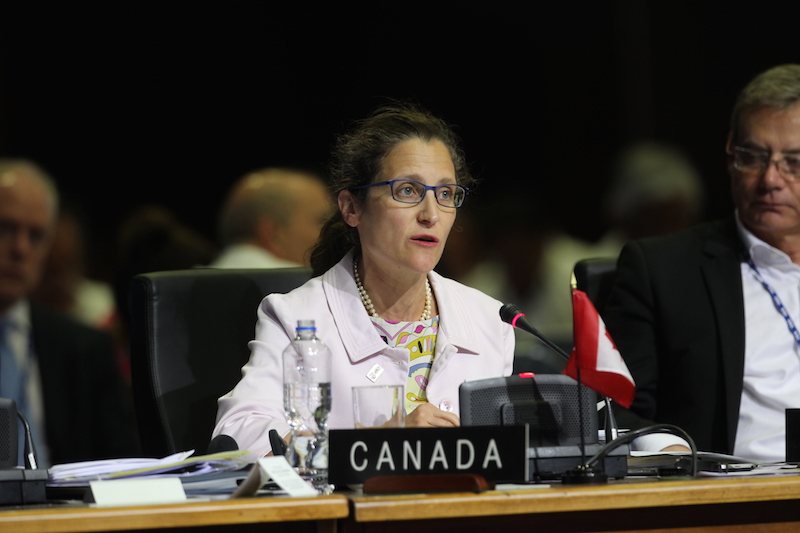Chrystia Freeland is one of the key stakeholders representing Canada in the NAFTA renegotiation talks. She currently serves as Canada’s Minister of Foreign Affairs, and has experience talking trade during her role as Minister of International Trade. While all three signatory countries intend to broker deals that are financially beneficial for their own respective economies, Minister Freeland hinted a shift in priorities. Two days prior to the talks commencing, Freeland stressed that the 23+ year trade agreement needs a progressive upgrade. Below are some of the new proposals that Canada is bargaining for, in an effort to bring NAFTA into alignment with modern principles.
New chapter on labour standards
Considered to be a win-win for all three trading countries, harmonizing labour regulations is believed to have a two-fold effect. For Canadians, particularly labour unions that have expressed this, our products would be more competitively priced in the marketplace once the US and Mexico follow suit with increasing wages and improving the working conditions of their workers. For instance, in Mexico, some factory workers could work 48 hours a week and earn about $7.00 a day. This reduces the buying power of its citizens and stagnates Mexico’s GDP. Worker protection rights do exist in Mexico by law, but their enforcement is another challenge. As it currently stands, NAFTA’s partners have an agreement on cooperating with each other’s labour laws and regulations. But, by including a new chapter on labour standards, Canada has a chance to level the playing field; so, participating countries won’t have disproportionate advantages over one another. The role of corporate social responsibility is another regulatory element that can propel labour standards towards modernization, as set out in the United Nations Sustainable Development Goals.
New chapter on environmental standards
While NAFTA already has an accompanying environmental agreement that highlights commitment for environmental protection, incorporating improved provisions satisfies the goal of prioritizing environmental conscientiousness. The Canadian government has not been specific in how it expects to achieve this, aside from tougher environmental protections. However, Article 24 of CETA, Canada’s trade agreement with the EU, could serve as a framework. Adopting provisions, like mitigating barriers to investment and trade of green products and services, is one example. As the US has withdrawn from the Paris Agreement, the addition of specific environmental standards is one way of ensuring that progressive environmental reform is met.
New chapter on gender rights
Perhaps sounding too ambitious from the outset, Canada and Chile have already included a chapter on gender in their own free trade deal. The inclusion of such a chapter was the first for Canada and any G20 nation. It includes general provisions, such as promoting the public’s knowledge of its gender equality laws, improving women’s access to and leadership in STEM fields, and implementing gender-based analysis. Should a chapter on gender rights be agreed upon by negotiating parties during NAFTA talks, it could set the gold standard for including gender perspectives in future trade agreements.
New chapter on indigenous rights
Suggested to Minister Freeland by Assembly of First Nations (AFN) National Chief, Perry Bellegarde, who is also an advisor on the NAFTA Council, it is arguably the most progressive consideration yet. Not only because it would be the first time that indigenous perspectives would be at the forefront of an international trade agreement, but because a member of the AFN is being invited to participate in the trade talks too. The visionary details of this chapter have yet to be outlined, but it can nonetheless be expected that improving trade relations and participation of indigenous peoples in the workforce will be the focus.
The potential addition of these new chapters symbolizes the evolving attitude of trade agreements towards becoming more value-based than simply being about money and jobs. This seems to be true for the Trudeau government, as many of these chapter proposals fall into line with their political platforms. But facing a protectionist government across the border that initiated renegotiation of NAFTA in the first place, it’s uncertain how much clout the Canadian government will have in bargaining for these new chapters.
Photo: “First Day of OAS General Assembly” (2017) by OEA-OAS via Flickr. Licensed under CC BY-NC-ND 2.0.
Disclaimer: Any views or opinions expressed in articles are solely those of the authors
and do not necessarily represent the views of the NATO Association of Canada.




